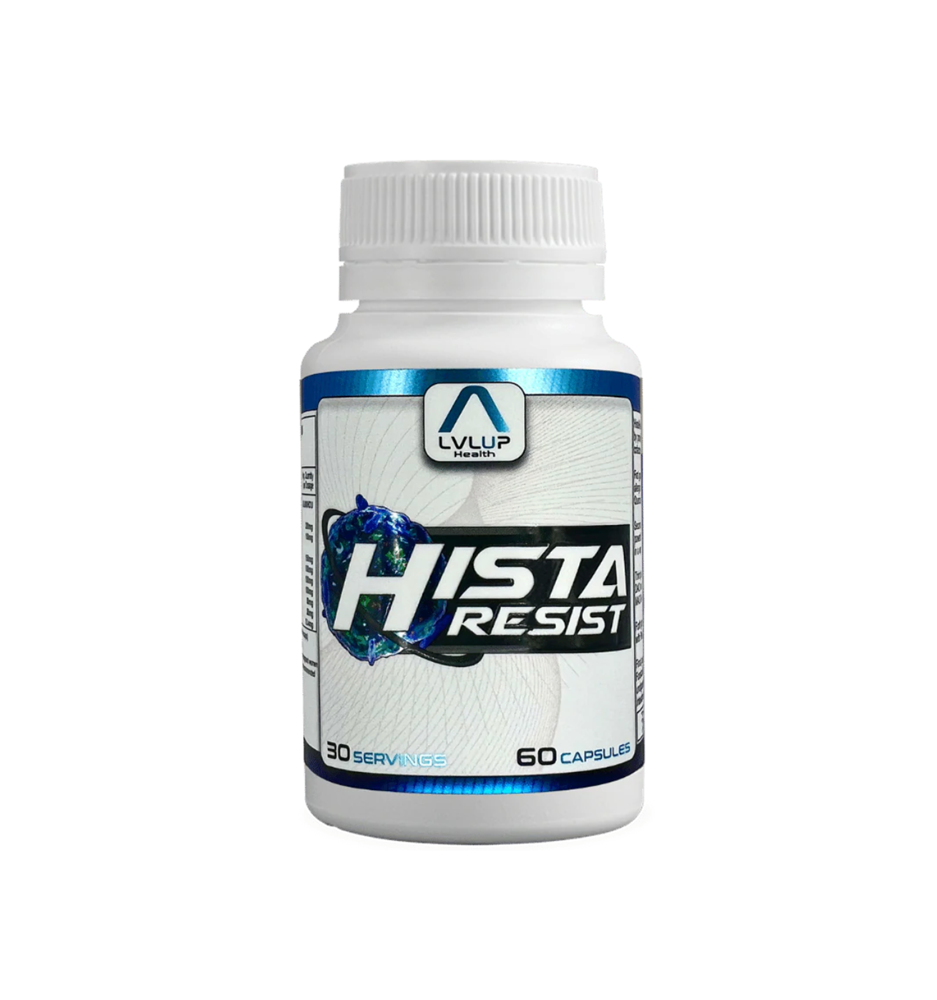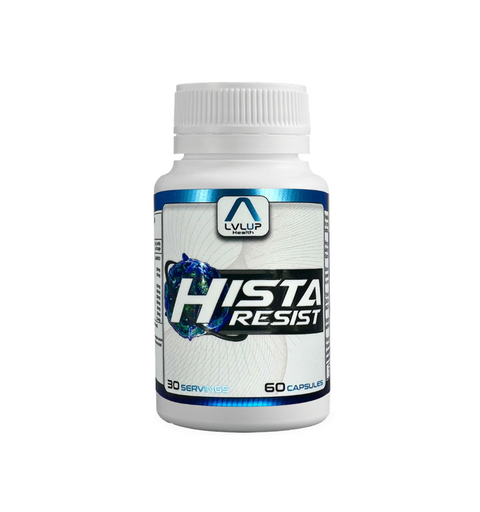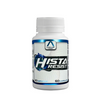- Regular price
- $118.00
- Sale price
- $118.00
- Regular price
-
- Unit price
- per
Address Histamine and Mast Cell Issues with Hista-Resist
Mast cell issues refer to conditions involving dysfunction or overactivity of mast cells, which are a type of white blood cell involved in the body's immune response. Mast cells play a critical role in allergic reactions and inflammation by releasing histamine and other substances in response to triggers such as allergens or pathogens.
Common mast cell-related conditions include:
-
Mast Cell Activation Syndrome (MCAS): This condition involves abnormal activation and degranulation of mast cells, leading to symptoms such as flushing, itching, hives, abdominal pain, diarrhea, and anaphylaxis. MCAS can be triggered by various factors, including stress, infections, medications, and environmental factors.
-
Mastocytosis: Mastocytosis is a group of rare disorders characterized by an excessive accumulation of mast cells in the skin, bone marrow, and internal organs. Symptoms may include skin lesions, itching, abdominal pain, bone pain, and systemic symptoms such as fatigue and malaise.
-
Histamine Intolerance: Histamine intolerance occurs when the body is unable to properly metabolize histamine, leading to an accumulation of histamine in the bloodstream. This can result in symptoms such as headaches, flushing, hives, digestive issues, and respiratory symptoms.
-
Allergic Reactions: Mast cells play a central role in allergic reactions by releasing histamine and other inflammatory mediators in response to allergens such as pollen, pet dander, insect venom, or certain foods. Allergic reactions can range from mild symptoms such as itching and sneezing to severe, life-threatening anaphylaxis.
-
Chronic Inflammatory Conditions: Mast cells are involved in chronic inflammatory conditions such as asthma, eczema, and inflammatory bowel disease (IBD). In these conditions, mast cell activation and release of inflammatory mediators contribute to ongoing inflammation and tissue damage.
Overall, mast cell issues can have a significant impact on quality of life and may require medical management, including avoidance of triggers, medications to stabilize mast cells or reduce histamine release, and lifestyle modifications.
Goal 1: Provide DAO2 Enzyme Support
DAO (Di-Amine Oxidase) enzyme is crucial for metabolizing histamine in the body and GI tract. Hista-Resist delivers a potent dose of supplemental DAO2 enzyme, preventing histamine from entering the bloodstream and alleviating systemic histamine symptoms.
- High Strength: 20,000 HDU (Histamine Degrading Units)
Goal 2: Stabilize Mast Cells with Synergistic Botanicals
A powerful blend of botanicals with mast cell stabilizing properties acts on mast cell membranes, preventing histamine release. Ingredients include:
- EMIQ
- Quercetin Anhydrous
- PEA (Palmitoylethanolamide)
- Luteolin
- Bromelain
- Baikal Skullcap
- Coleus Forskohlii
Goal 3: Support Enzymes with Nutritional Co-factors
Essential enzymes require cofactor nutrients for optimal function. Hista-Resist includes:
- Vitamin C and Copper for DAO2 function
- Vitamin B2 for MAO-B function
- SAMe and B-Vitamins for HNMT support
Goal 4: Increase HCl Production
Coleus forskohlii supports HCl stomach acid secretion, reducing the need for histamine production. This aids protein digestion, minimizing gut irritation and histamine reactions.
Dosage and Timing
Dosage recommendations may vary based on individual reactivity to histamine. As a starting point, take 1-2 capsules per day or as recommended by a practitioner. For maximum benefit, take before meals, especially if certain foods trigger histamine reactions. Taking Hista-Resist away from meals can aid in clearing residual histamine.
Safety
Hista-Resist is generally safe with no known side effects. However, prolonged use of supplemental copper may disrupt Zinc:Copper ratios, potentially leading to copper toxicity. Use as directed and consult with a healthcare professional if you have concerns.
Conclusion
Say goodbye to histamine and mast cell issues with Hista-Resist. Restore balance to your body and enjoy life without the burden of histamine-related symptoms.
Address Histamine and Mast Cell Issues with Hista-Resist
Mast cell issues refer to conditions involving dysfunction or overactivity of mast cells, which are a type of white blood cell involved in the body's immune response. Mast cells play a critical role in allergic reactions and inflammation by releasing histamine and other substances in response to triggers such as allergens or pathogens.
Common mast cell-related conditions include:
-
Mast Cell Activation Syndrome (MCAS): This condition involves abnormal activation and degranulation of mast cells, leading to symptoms such as flushing, itching, hives, abdominal pain, diarrhea, and anaphylaxis. MCAS can be triggered by various factors, including stress, infections, medications, and environmental factors.
-
Mastocytosis: Mastocytosis is a group of rare disorders characterized by an excessive accumulation of mast cells in the skin, bone marrow, and internal organs. Symptoms may include skin lesions, itching, abdominal pain, bone pain, and systemic symptoms such as fatigue and malaise.
-
Histamine Intolerance: Histamine intolerance occurs when the body is unable to properly metabolize histamine, leading to an accumulation of histamine in the bloodstream. This can result in symptoms such as headaches, flushing, hives, digestive issues, and respiratory symptoms.
-
Allergic Reactions: Mast cells play a central role in allergic reactions by releasing histamine and other inflammatory mediators in response to allergens such as pollen, pet dander, insect venom, or certain foods. Allergic reactions can range from mild symptoms such as itching and sneezing to severe, life-threatening anaphylaxis.
-
Chronic Inflammatory Conditions: Mast cells are involved in chronic inflammatory conditions such as asthma, eczema, and inflammatory bowel disease (IBD). In these conditions, mast cell activation and release of inflammatory mediators contribute to ongoing inflammation and tissue damage.
Overall, mast cell issues can have a significant impact on quality of life and may require medical management, including avoidance of triggers, medications to stabilize mast cells or reduce histamine release, and lifestyle modifications.
Goal 1: Provide DAO2 Enzyme Support
DAO (Di-Amine Oxidase) enzyme is crucial for metabolizing histamine in the body and GI tract. Hista-Resist delivers a potent dose of supplemental DAO2 enzyme, preventing histamine from entering the bloodstream and alleviating systemic histamine symptoms.
- High Strength: 20,000 HDU (Histamine Degrading Units)
Goal 2: Stabilize Mast Cells with Synergistic Botanicals
A powerful blend of botanicals with mast cell stabilizing properties acts on mast cell membranes, preventing histamine release. Ingredients include:
- EMIQ
- Quercetin Anhydrous
- PEA (Palmitoylethanolamide)
- Luteolin
- Bromelain
- Baikal Skullcap
- Coleus Forskohlii
Goal 3: Support Enzymes with Nutritional Co-factors
Essential enzymes require cofactor nutrients for optimal function. Hista-Resist includes:
- Vitamin C and Copper for DAO2 function
- Vitamin B2 for MAO-B function
- SAMe and B-Vitamins for HNMT support
Goal 4: Increase HCl Production
Coleus forskohlii supports HCl stomach acid secretion, reducing the need for histamine production. This aids protein digestion, minimizing gut irritation and histamine reactions.
Dosage and Timing
Dosage recommendations may vary based on individual reactivity to histamine. As a starting point, take 1-2 capsules per day or as recommended by a practitioner. For maximum benefit, take before meals, especially if certain foods trigger histamine reactions. Taking Hista-Resist away from meals can aid in clearing residual histamine.
Safety
Hista-Resist is generally safe with no known side effects. However, prolonged use of supplemental copper may disrupt Zinc:Copper ratios, potentially leading to copper toxicity. Use as directed and consult with a healthcare professional if you have concerns.
Conclusion
Say goodbye to histamine and mast cell issues with Hista-Resist. Restore balance to your body and enjoy life without the burden of histamine-related symptoms.





